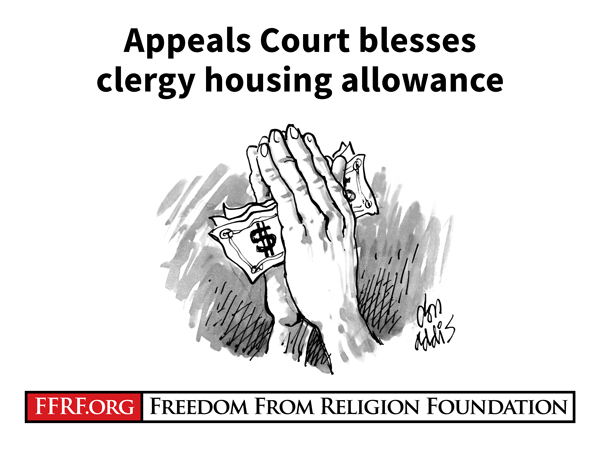
A three-judge panel of the 7th U.S. Circuit Court of Appeals in Chicago today ruled against the Freedom From Religion Foundation’s historic challenge of a housing allowance in the tax code that uniquely privileges clergy.
FFRF had won a favorable ruling by a federal judge in 2017, who found unconstitutional 26 U.S.C. § 107(2). That provision in the tax code allows “ministers of the gospel” to exclude from gross income any “housing allowance” paid by their church.
The 7th Circuit panel, in a decision written by Judge Michael B. Brennan, found that the plaintiffs and FFRF had proved their standing, and have properly alleged a ‘concrete, dollars-and-cents injury.’“ Nevertheless, it ruled 3-0 against FFRF on the merits. The other judges are William Bauer and Daniel Manion.
A billion-dollar tax benefit to “ministers of the gospel,” in the minds of these three judges, “has a secular legislative purpose, its principal effect is neither to endorse nor to inhibit religion, and it does not cause excessive government entanglement.”
Reacts FFRF Co-President Annie Laurie Gaylor, one of the plaintiffs: “The housing allowance is so clearly a handout to churches and clergy, and it so clearly shows preferential treatment and discriminating in favor of ministers.”
The provision also clearly discriminates against nontheistic leaders who are similarly situated to clergy, Gaylor added, especially since the sponsor of the 1954 law challenged by FFRF, Rep. Peter Mack, argued that ministers should be rewarded with a clergy allowance for “carrying on such a courageous fight against this [a godless and anti-religious world movement].”
The clergy allowance is not a tax deduction, but an exemption — allowing housing allowances paid as part of clergy salary to be subtracted from taxable income. The congressional Joint Committee on Taxation has reported that the exemption amounts to $700 million a year in lost revenue. Religion News Service calculated the allowance increases the take-home pay of some pastors by up to 10 percent. Churches benefit, since tax-free salaries lower their overhead. Christianity Today found that 84 percent of senior pastors receive a housing allowance of $20,000 to $38,000 in added (but not reported) compensation to their base salary.
The co-plaintiffs with Gaylor were FFRF Co-President Dan Barker and Ian Gaylor, representing the estate of President Emerita Anne Nicol Gaylor. FFRF had designated a housing allowance for the trio, and on that basis they sued the IRS. FFRF’s complaint alleged that the allowance “directly benefits ministers and churches, most significantly by lowering a minister’s tax burden, while discriminating against the individual plaintiffs, who as the leaders of a nonreligious organization opposed to governmental endorsements of religion are denied the same benefit.”
This is the second time FFRF had come before the 7th Circuit asking it to find the tax code provision unconstitutional. In 2013, U.S. District Judge Barbara Crabb ruled in FFRF’s favor in its original challenge. Crabb’s finding sent “shockwaves through the religious community,” according to the Evangelical Council for Financial Accountability, which bitterly fought the ruling, along with just about every religious denomination in the country.
In November 2014, the 7th Circuit threw out FFRF’s first victory, saying the trio would need to prove their standing to sue by seeking and being denied a refund of their housing allowance. Accordingly, they sought the refunds and when denied, went back to court.
While Crabb ruled that “the plain language of the statute, its legislative history and its operation in practice all demonstrate a preference for ministers over secular employees,” the appeals court panel disagreed, applying what they called “the historic significance test.”
Wrote Brennan: “FFRF claims §107(2) renders unto God that which is Caesar’s. But this tax provision falls into the play between the joints of the Free Exercise Clause and the Establishment Clause: neither commanded by the former, nor proscribed by latter. We conclude §107(2) is constitutional. The judgment of the district court is reversed.”
This shows that ministers are not entitled to the benefit, therefore Congress could repeal it. “It’s an injustice not just to us, but to taxpayers who have to pay more than their share, because clergy pay less,” Gaylor says.
Nor did the appeals court decision address the problem that the financial benefits apply even wealthy ministers. “The manner in which our housing allowance has been used borders on clergy malpractice,” William Thornton, a Georgia pastor and blogger, told Forbes magazine in 2013. “A growing subset of ministers who are very highly paid and who live in multi-million dollar mansions are able to exclude hundreds of thousands of dollars from income taxation.”
Clergy may use the housing allowance not just for rent or mortgage, but for home improvements, including maintenance, home improvements and repairs, dishwashers, cable TV and phone fees, paint, towels, bedding, home décor, even personal computers and bank fees. They may exempt from taxable income up to the fair market rental value of their home, particularly helping well-heeled pastors. The subsidy extends to churches, which can pay clergy less, as tax-free salaries go further.
The defendants were Steve Mnuchin, U.S. secretary of the treasury, and Charles Rettig, current IRS commissioner. The case also had religious intervenors as defendants.
The case was filed on behalf of FFRF by litigator Richard L. Bolton. Tax law professor Adam Chodorow, who was counsel of record in a friend of the court brief on behalf of FFRF, joined Bolton in the oral arguments. Gaylor et al v. U.S. Treasury has case number 3:16-cv-00215.